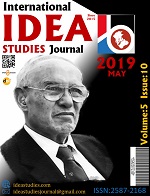Author :
Abstract
Döviz kuru; temel olarak bir ülke para biriminin başka bir ülke para birimi cinsinden ifadesidir ve bir ülkenin parasının gerçek değerini belirlemede önemli bir faktördür. Ayrıca, döviz kurları, ülkelerin rekabet edebilirliğini gösteren bir göstergedir. Bununla birlikte döviz kuru ihracat, ithalat, enflasyon, faiz, yatırımlar ve bunun gibi bazı makroekonomik değişkenlerle yakından ilişkilidir. Kısa dönemde döviz kurlarındaki değişimler bu makroekonomik faktörlerin yanı sıra ekonomik büyüme üzerinde de etkili olmaktadır. Kurun değerinin yüksek tutulması dolayısıyla ulusal paranın değer kaybetmesi ekonomik büyümeyi kısa dönemde pozitif etkilerken uzun dönemde negatif etkileyebilmektedir. Dengeli bir ekonomik büyüme için hükümetlerin döviz kurları ile ilgili politikalarını doğru belirlemeleri gerekmektedir. Reel döviz kurları ile ekonomik büyüme arasındaki ilişkinin gelişmiş ve gelişmekte olan ülkeler açısından farklı sonuçlar vereceği literatürde vurgulanmaktadır. Genel olarak, gelişmiş ülkelerde ekonomik büyüme ile reel döviz kurları arasında etkin bir ilişki yokken, bu etkinin gelişmekte olan ülkelerde belirgin ve negatif olduğu görülmektedir. Bununla birlikte, reel efektif döviz kuru ve ekonomik büyüme arasındaki ilişkilerin varlığı hala tartışılan bir konu olarak güncelliğini korumaktadır. Bu çalışmanın amacı farklı gelir düzeyine sahip ülke grupları için reel efektif döviz kuruyla ekonomik büyüme arasındaki kısa dönemli ilişkilerin olup olmadığını panel nedensellik testiyle araştırmaktır. Reel efektif döviz kuru ve ekonomik büyüme arasındaki kısa dönemli nedensellik ilişkileri panel veri nedensellik analizi ile araştırılmıştır. Çalışmadan elde edilen sonuçlar ülkeden ülkeye değişmekle birlikte, ekonomik büyümeden reel efektif kura doğru pozitif bir nedensellik ilişkisi olduğu, reel efektif kurdan ekonomik büyümeye doğru ise negatif bir nedensellik ilişkisi olduğu görülmüştür.
Keywords
Abstract
Exchange rate is basically the equivalent of the currency of a country in the currency of another country and is an important factor in determining the real value of a country's money. Beside, exchange rates are the indicator of the competitiveness of countries. However, the exchange rate is closely related to some macroeconomic variables such as exports, imports, inflation, interest, investments and so on. The changes in the exchange rates also affect economic growth as well as these macroeconomic factors in the short term. While high value of the exchange rate affects economic growth positively in the short term, it may negatively affect the growth in the long term. For a balanced economic growth, governments must correctly determine their policies on exchange rates. That the relationship between real exchange rates and economic growth will give different results for the developed and developing countries is emphasized in the literature. In general, while there is no effective relationship between economic growth and real exchange rates in developed countries, this effect is explicit and negative in developing countries. However, The existence of the relationships between real effective exchange rate and economic growth continues to be relevant. The aim of this study is to investigate whether there are short and long term relationships between real effective exchange rate and economic growth for country groups with different income levels using causality tests. Short-term causality relationships between real effective exchange rate and economic growth were investigated with panel data causality analysis. Although the results obtained from the study changed from a country to another one, it was observed that there was a positive causality relation from economic growth to real effective exchange rate and a negative causality relation from real effective exchange rate to economic growth.
Keywords
- Ahmad, A.,Ahmad, N., And Ali. S., (2013), “Exchange Rate And Economic Growth İn Pakistan
- Ahmad, A.,Ahmad, N., And Ali. S., (2013), “Exchange Rate And Economic Growth İn Pakistan (1975-2011)’’, Journal Of Basic And Applied Scientific Research, , 3(8), 740-746.
- Barguellıl, A.,Ben-Salha, O., And Zmamı, M., (2018), “Exchange Rate Volatility And Economic Growth’’, Journal Of Economic Integration, 33(2), 1302-1336.
- Chen, J., (2012), “Real Exchange Rate And Economic Growth: Evidence From Chinese Provincial Data (1992 - 2008)’’, Halshs.Archives-Ouvertes, 1-29.
- Çelik,T., Çelik, B., Barak, D., (2017), “ Geçiş Ekonomilerinde Reel Döviz Kuru Ve EkonomikBüyüme İlişkisi’’süleyman Demirel Üniversitesi İktisadi Ve İdari Bilimler Fakültesi Dergisi , 22(3), 877-890.
- Çiftçi, N., (2014), “Türkiye’de Cari Açık, Reel Döviz Kuru Ve Ekonomik Büyüme Arasındakiİlişkiler: Eş Bütünleşme Analizi’’, Anadolu Üniversitesi Sosyal Bilimler Dergisi, 14(1), 129-142.
- Erbaykal, E. (2007), “Türkiye’de Ekonomik Büyüme Ve Döviz Kuru Cari Açık Üzerinde Etkili Midir? Bir Nedensellik Analizi’”, Zkü Sosyal Bilimler Dergisi, 3(6), 81–88.
- Javed H. Z. Farooq M., (2009), “Economic Growth And Exchange Volatility In Case Of Pakistan”, Pakistan Journal Of Life And Social Sciences,7(2): 112-118.
- Jakop, B., (2015), “Impact Of Exchange Rate Regimes On Economic Growth’’,Undergraduate Economic Review, 12(1), 1-23.
- Khondker B.H.,Bıdısha, S.H., And Razzaque, M.H., (2012) ,“The Exchange Rate And EconomicGrowth: An Empirical Assessment On Banglades’’,Journal Of South Asian Development, 12(1),1- 51.
- Kogıd, M., Asıd, R., Lıly, J., Mulok, D., And Loganathan, N., (2012), “The Effect Of ExchangeRates On Economic Growth: Empirical Testing On Nominal Versus Real’’, Iup Journal Of Economic X(1), 7-17.
- Kónya, L., “Exports And Growth: Granger Causality Analysis On Oecd Countries With A Panel Data Approach”,Economic Modelling,Vol. 23, No.6, Pp. 978-992. 2006.
- Korkmaz, S., (2015), “The Effect Of Exchange Rate On Economıc Growth’’, Eskişehir Osmangazi Üniversitesi İibf Dergisi, 10(3), 47-76.
- Mwınlaaru, P.Y. And Oforı, K.I.,(2017), “Real Exchange Rate And Economic Growth İn Ghana’’, Munich Personal Repec Archive, Mpra Paper No. 82405, 1-45.
- Pekmezci, A., Bozkurt, K., (2016), “Döviz Kuru Ve Ekonomik Büyüme: Türk Turizm Sektörü İçin Bir Analiz’’, Süleyman Demirel Üniversitesi Sosyal Bilimler Enstitüsü Dergisi, 24(2), 97-110.
- Razın, O, And Collıns, S. M., (1997), “Real Exchange Rate Misalignment Sand Growth’’,National Bureau Of Economic Research, Working Paper No. 6174, 1-21.
- Razzaque, M. A.,Bıdısha, S.H., And Khondke, B.H., (2017), “Exchange Rate And EconomicGrowth: An Empirical Assessment For Bangladesh’’, Journal Of South Asian Development 12(1), 42–64.
- Rodrık, D., (2008), “The Real Exchange Rate And Economic Growth, Brookings Papers On Economic Activity, 365-439.
- Ünlü, H. (2016),”Döviz Kuru Oynaklığı Ve Ekonomik Büyüme: Türkiye Örneği’’, Sakarya İktisat Dergisi, 5(3), 17-31.
